How Virtual Assistants Support Legal Process Outsourcing Services
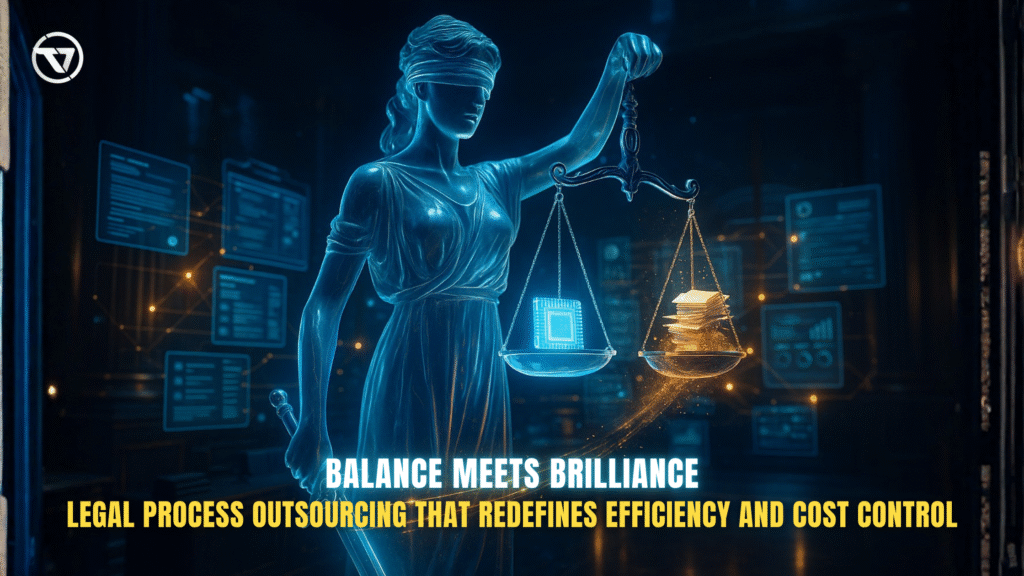
Legal Process Outsourcing: A Growing Need in a Complex Legal Landscape
Legal Process Outsourcing (LPO) has become an essential strategy for law firms, legal departments, and corporations looking to manage high workloads, rising costs, and increasing compliance demands. With legal complexity rising worldwide, more firms now outsource tasks such as documentation, case research, compliance support, and contract management.
The legal outsourcing market is expanding rapidly. According to Grand View Research, the global LPO market is projected to reach USD 60.7 billion by 2030 due to rising demand for cost-efficient legal support. Another study by Deloitte revealed that 71% of law firms use outsourcing to reduce operational costs — showing the industry’s strong shift toward smarter resourcing models.
In this evolving environment, virtual assistants trained in legal support are becoming valuable assets, providing scalable, compliant, and cost-effective assistance for legal operations.
What Are Legal Process Outsourcing Services

Legal Process Outsourcing services involve delegating legal functions — ranging from research and drafting to compliance and document review — to external professionals who support law firms and corporate legal teams. These services help organizations reduce administrative burdens, increase productivity, and improve turnaround times.
A study by Gartner shows that legal departments spend up to 50% of their time on routine administrative tasks that do not require attorney-level expertise. This is why LPO has become an operational strategy rather than an optional tool.
Virtual assistants contribute significantly by handling recurring, detail-oriented, and time-consuming tasks, allowing legal professionals to focus on strategy and high-value decisions.
How Legal Process Outsourcing Services Work
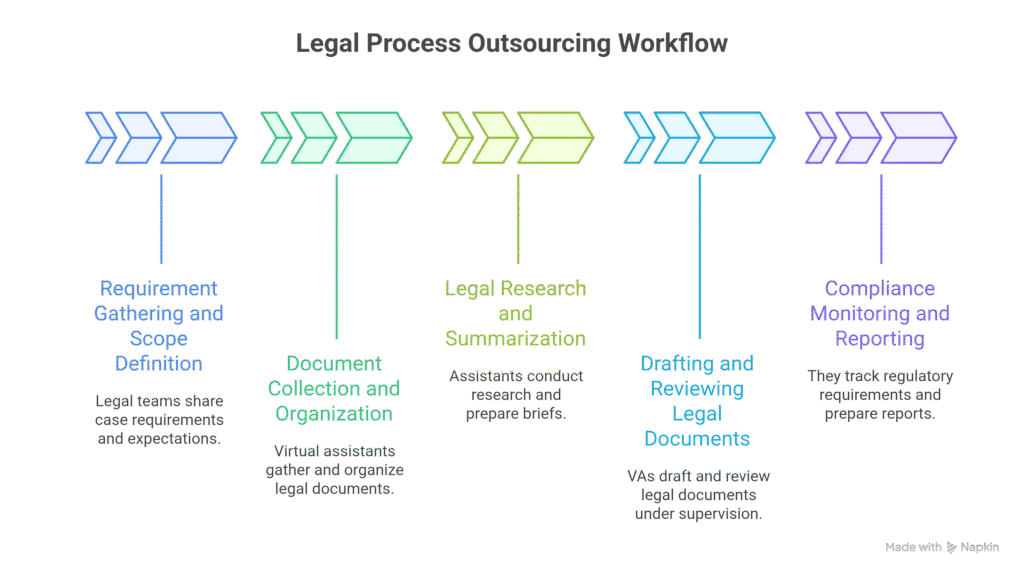
Legal outsourcing follows a systematic workflow designed to ensure accuracy, confidentiality, and compliance across all legal operations. Virtual assistants support nearly every stage of this process.
1. Requirement Gathering and Scope Definition
Legal teams share case requirements, deadlines, access levels, and deliverable expectations. Virtual assistants help organize initial data and prepare documentation.
2. Document Collection and Organization
VAs gather case files, client information, perform transcription, emails, exhibits, and legal documents. They organize them into standardized formats for attorneys and paralegals.
3. Legal Research and Summarization
Assistants conduct case research, extract relevant statutes, summarize rulings, and prepare easy-to-read briefs. According to the American Bar Association, legal professionals save up to 40% more time when research tasks are outsourced — allowing faster case progress.
4. Drafting and Reviewing Legal Documents
Virtual assistants prepare standard drafts such as NDAs, contracts, letters, motions,blogs, and client communication templates under attorney supervision.
5. Compliance Monitoring and Reporting
They track regulatory requirements, maintain compliance checklists, and prepare compliance reports for audits or filings.
Key Features of Legal Process Outsourcing Services
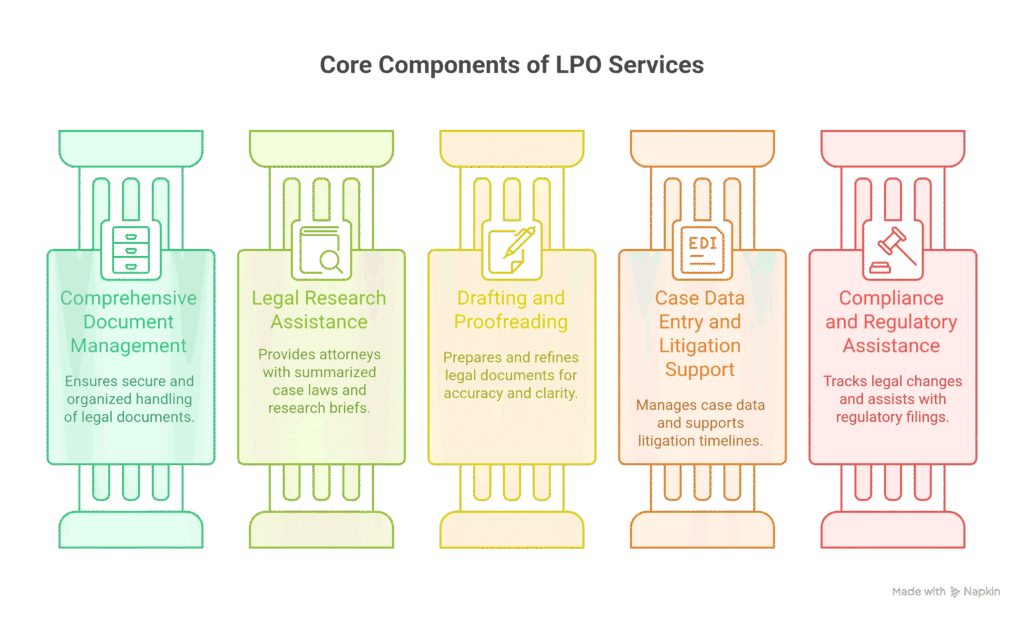
Legal outsourcing services come with essential features that ensure productivity, accuracy, and secure information flow. These features help legal teams operate smoothly while reducing administrative burden.
Below are the core components that define strong LPO support.
1. Comprehensive Document Management
From intake to archiving, VAs manage documents with version control and secure organization.
2. Legal Research Assistance
They extract case laws, summarize judgments, and prepare easy-to-reference research briefs for attorneys.
3. Drafting and Proofreading Legal Documents
VAs prepare drafts of standard legal documents, check formatting, and proofread for grammatical and structural accuracy.
4. Case Data Entry and Litigation Support
Assistants update case management software, maintain client files, and support litigation timelines with reminders and scheduling.
5. Compliance and Regulatory Assistance
They track changes in laws, update compliance logs, and assist with regulatory filings under attorney guidance.
Benefits of Legal Process Outsourcing Services
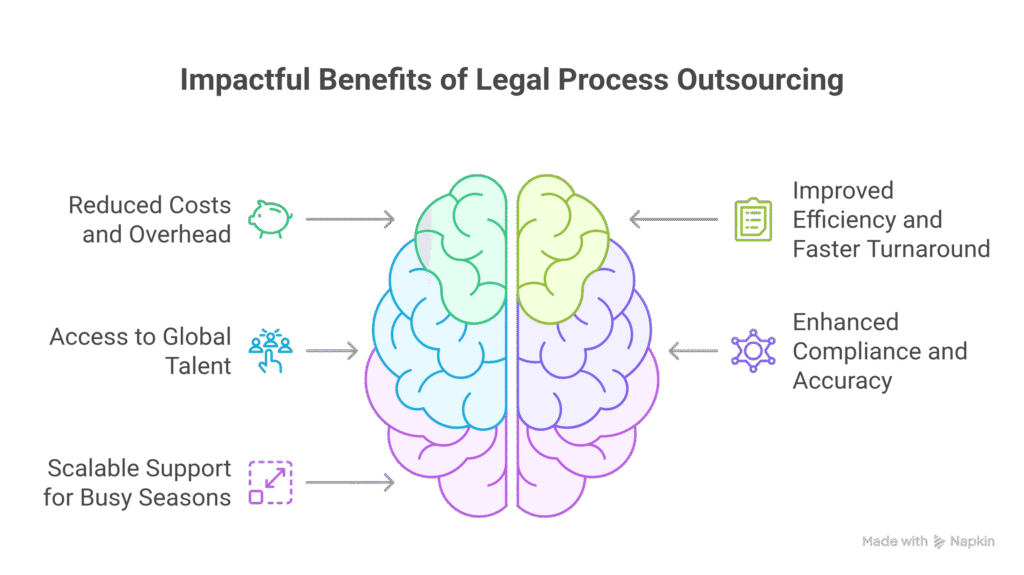
Legal outsourcing provides significant advantages to both large and small law practices. These benefits enable firms to scale operations, cut costs, and improve overall efficiency.
Below are the most impactful benefits of LPO services.
1. Reduced Costs and Overhead
Outsourcing can reduce legal operational expenses by up to 30–50% compared to in-house teams, according to Deloitte.
2. Improved Efficiency and Faster Turnaround
Routine tasks are handled promptly by VAs, allowing attorneys to focus on litigation, negotiation, and strategy.
3. Access to Global Talent
LPO opens access to professionals with legal knowledge, research capability, and multilingual expertise.
4. Enhanced Compliance and Accuracy
With strict monitoring and documentation processes, virtual assistants help maintain compliance and minimize errors.
5. Scalable Support for Busy Seasons
During peak litigation or contract cycles, virtual assistants provide instant scalability without long-term hiring commitments.
How to Implement Legal Process Outsourcing Services for Your Law Firm
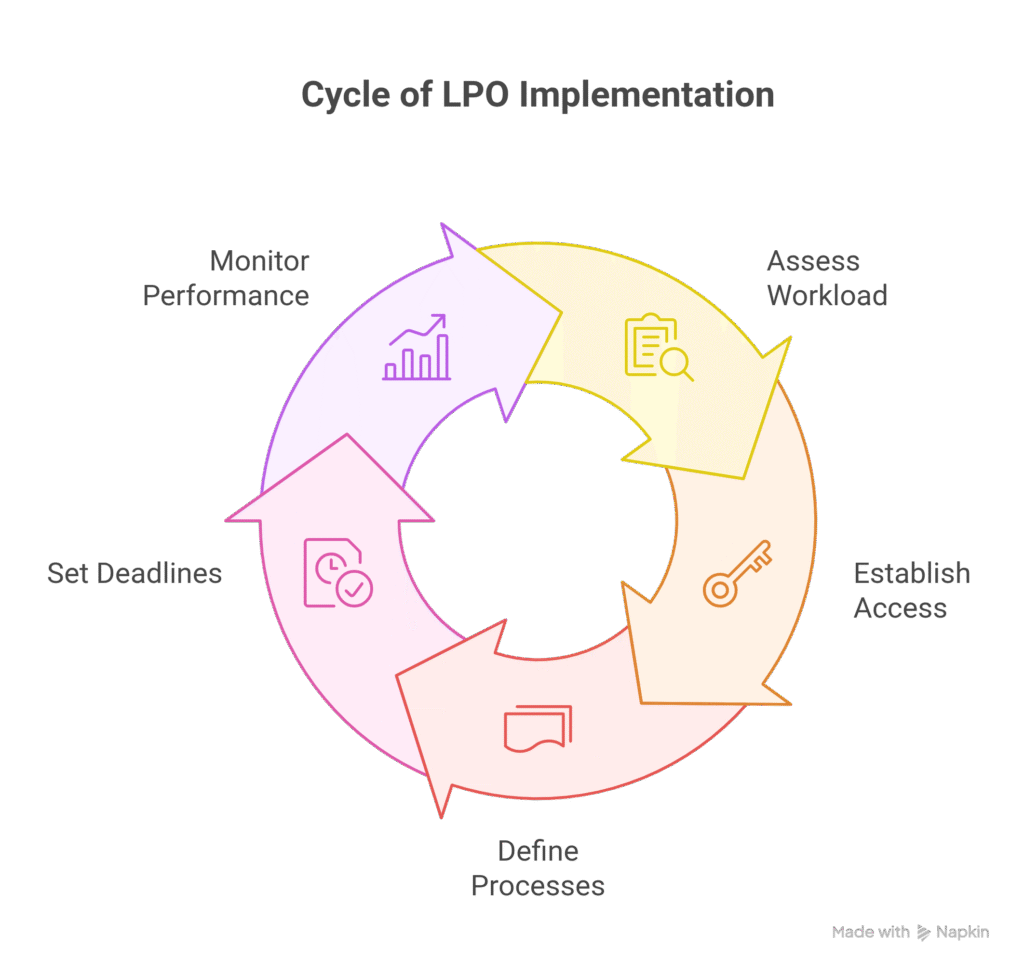
Successful LPO implementation requires systematic planning and a structured workflow.
Below is a step-by-step approach to integrating outsourcing into your legal operations.
1. Assess Your Workload and Identify Tasks to Outsource
List recurring, time-consuming, or administrative tasks that hinder legal efficiency.
2. Establish Access Permissions and Secure Infrastructure
Grant VAs restricted, encrypted, and compliant access to files, emails, or software systems.
3. Define Processes and Communication Channels
Clear documentation, communication guidelines, and workflow charts eliminate confusion.
4. Set Deadlines and Turnaround Expectations
VAs follow SLAs, task timelines, and revision processes agreed upon by the legal team.
5. Monitor Performance and Optimize Workflows
Regular reviews help refine delegation methods and enhance productivity.
How Virtual Assistants Help in Legal Process Outsourcing

Virtual legal assistants play a critical role in LPO by managing research-heavy, documentation-focused, and administrative tasks with precision. Their involvement ensures attorneys spend more time on legal reasoning and client advocacy.
Below are the major ways VAs support LPO operations.
1. Drafting, Reviewing, and Formatting Legal Documents
VAs create templates, rewrite drafts, format filings, and maintain document consistency for attorneys.
2. Managing Case Files and Client Records
Assistants update client files, upload supporting documents, and maintain litigation calendars.
3. Conducting Legal and Regulatory Research
They extract relevant information from case databases and provide summarized insights for legal strategies.
4. Handling Compliance Tracking and Audit Preparation
VAs maintain compliance logs, monitor regulatory updates, and prepare audit-ready documentation.
5. Supporting Contract Management and Renewals
They track contract deadlines, renewals, obligations, and metadata for smooth contract lifecycles.
TaskVirtual: Your Partner in Legal Process Outsourcing Support

At TaskVirtual, our virtual assistants are trained to provide consistent, accurate, and reliable support for legal teams of all sizes.
Our legal-support VAs offer:
- Legal research assistance
- Document drafting and formatting
- Contract management and tracking
- Compliance monitoring support
- Case file organization
- Litigation scheduling support
- Administrative assistance for attorneys
With 364+ positive client reviews and a 4.7-star satisfaction rating, TaskVirtual’s VAs bring professionalism, structure, and precision to every legal workflow.
Starting at only $3.12 per hour, our services give law firms access to premium talent without expensive hiring costs.
Final Thoughts on Legal Process Outsourcing Services
Legal Process Outsourcing is no longer a cost-cutting tactic — it is a strategic necessity for modern law firms. With rising case volumes, complex compliance requirements, and increasing administrative tasks, legal teams need scalable support to stay competitive.
Virtual assistants bring structure, speed, and accuracy to LPO workflows, helping attorneys focus on advocacy, negotiation, and high-value legal work.
With TaskVirtual as your partner, your firm gains reliable, efficient, and knowledgeable legal support — driving operational excellence and long-term success.
FAQs
1. What types of legal tasks can be outsourced?
Document drafting, research, compliance tracking, case file management, and more.
2. Are virtual legal assistants trained in confidentiality?
Yes. TaskVirtual’s VAs follow strict confidentiality, NDAs, and secure-access protocols.
3. Can VAs work with legal software systems?
Yes — including Clio, MyCase, PracticePanther, and document management platforms.
4. Does outsourcing improve law firm efficiency?
Significantly. Firms free attorneys from repetitive tasks, improving billable-hour utilization.
5. Why choose TaskVirtual for LPO support?
Because TaskVirtual’s VAs deliver fast, accurate, and secure legal operational support at highly cost-effective rates.



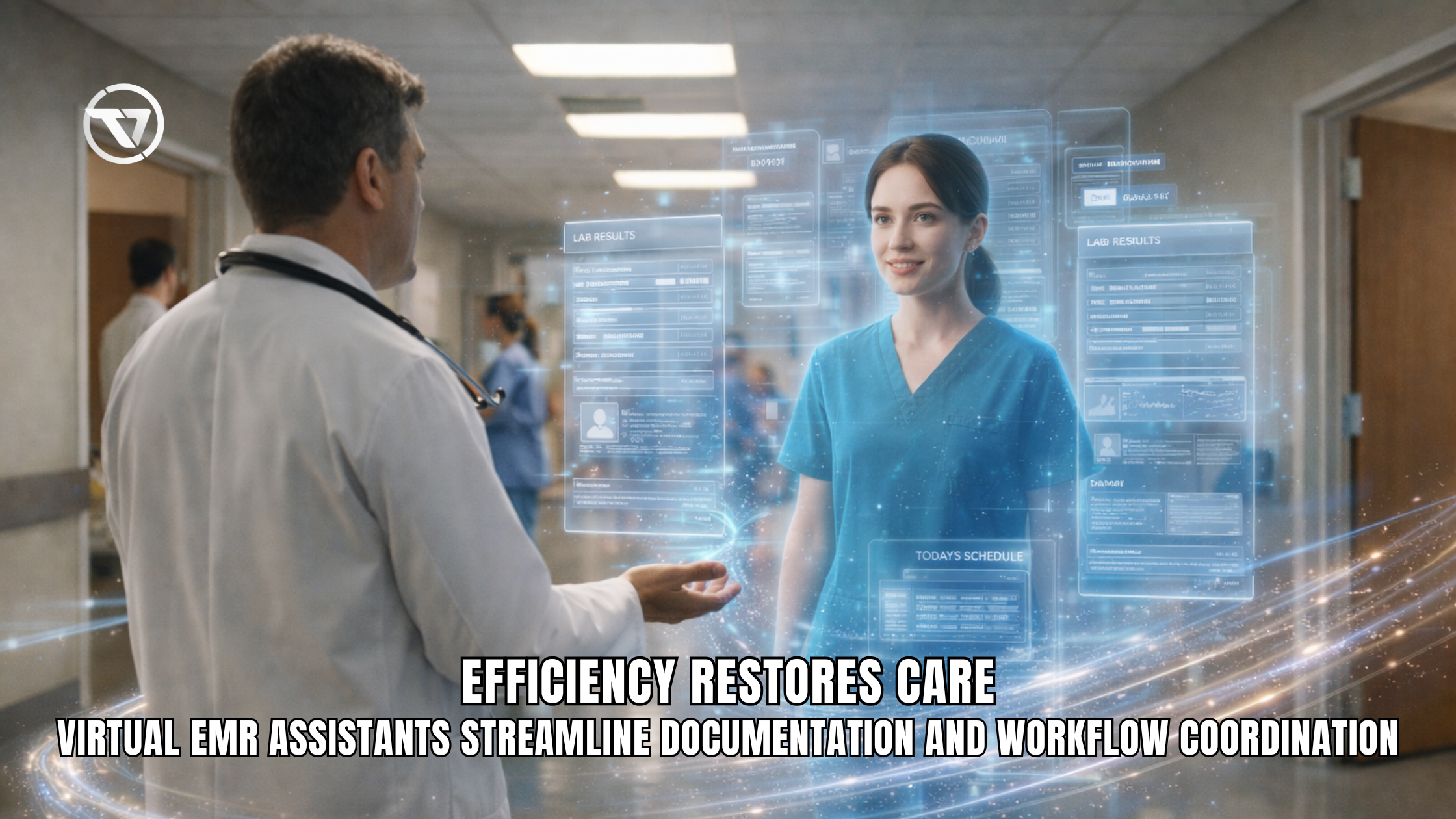


Great read! I like how you explained the role of virtual assistants in LPO — especially the way they help with research, documentation, and case management. It’s a clear reminder that VAs can really boost efficiency for legal teams.